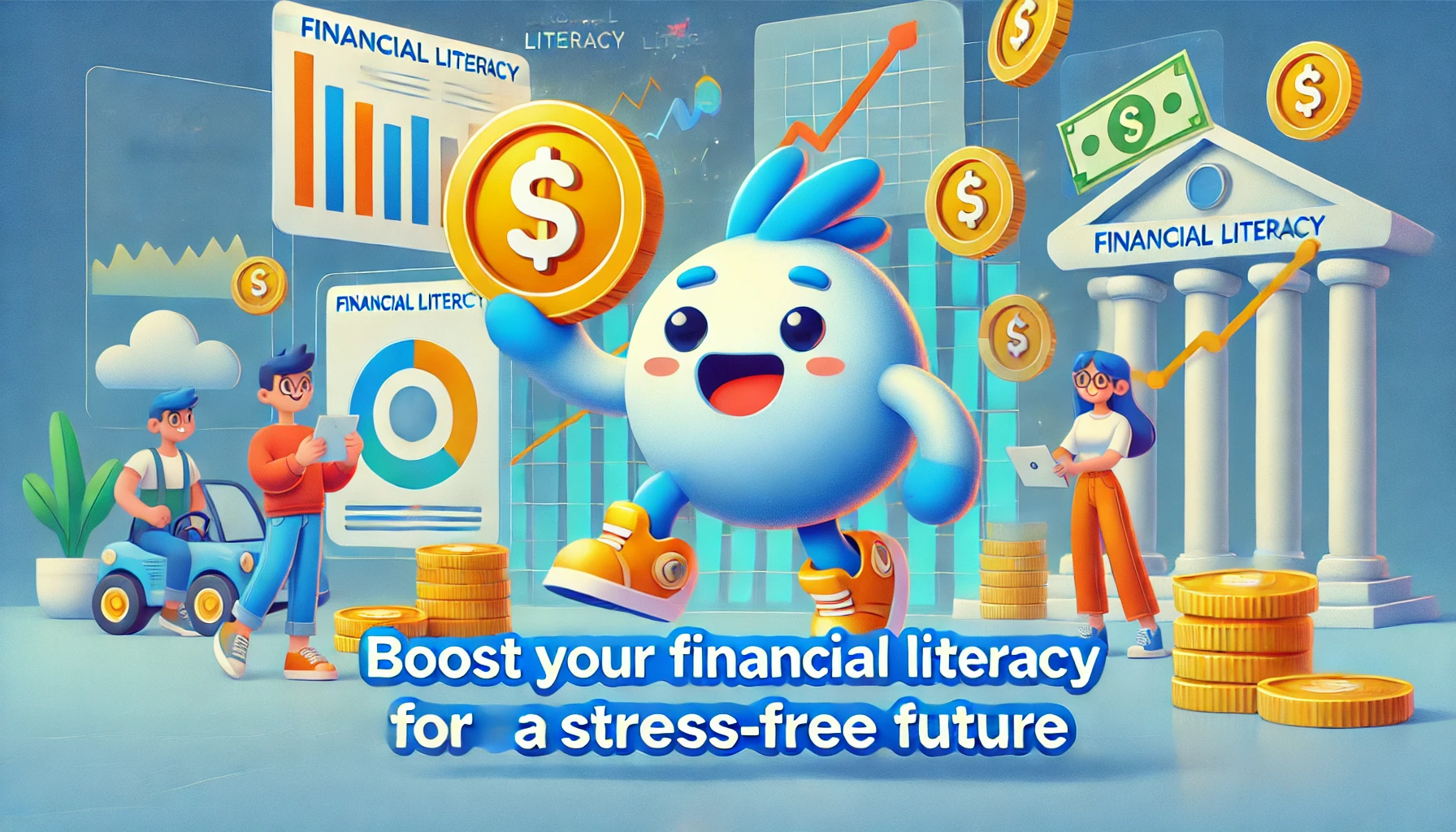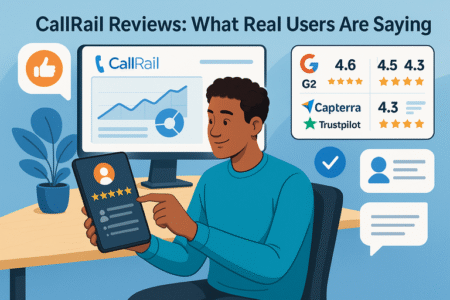Table of Contents
Are you confident in managing your money, or do financial decisions often leave you feeling stressed? Financial literacy is the key to building a stable and stress-free financial future, but many people don’t know where to begin. What skills are essential to financial success, and how can improving your financial knowledge lead to long-term security?
This article will answer these questions and provide practical tips for boosting your financial literacy so you can feel confident in every money-related decision.
What Is Financial Literacy and Why It Is Critical for Success
Financial literacy is the ability to understand and manage your personal finances effectively. It encompasses skills such as budgeting, saving, investing, and understanding credit.
Without financial literacy, it’s easy to fall into debt and struggle with money management. I believe mastering financial literacy is key to a secure and stress-free financial future.
Why is financial literacy so critical? It provides the knowledge to make informed decisions, avoid financial pitfalls, and build wealth over time. From day-to-day spending to long-term financial goals, those who are financially literate can navigate the complexities of personal finance with greater confidence and control. This expertise also reduces anxiety around money.
The Foundation of Building Smart Money Habits
Smart money habits begin with understanding the basics of budgeting and living within your means. I find that creating a budget is a vital first step in taking control of your finances. It helps you allocate your income towards essential needs, savings, and occasional wants without overspending. Consistently tracking your expenses will reinforce these habits.
Saving regularly, even small amounts, is another critical habit. I recommend starting with an emergency fund that covers at least three to six months of expenses. This can prevent financial crises from derailing your plans. I’ve also noticed that developing a savings mindset early can reduce stress about unexpected costs.
Making informed purchases is another aspect of smart money management. I advise considering long-term value over short-term gratification. This means distinguishing between wants and needs. For instance, spending on experiences that enrich your life may offer better returns than impulse buys. I’ve learned that mindfulness in spending can greatly improve your financial well-being.
Paying bills on time is a habit that often gets overlooked but is incredibly important. Late payments can damage your credit score and incur costly fees. I encourage automating payments to avoid missing due dates. It’s a simple strategy that can boost your financial standing over time.
Finally, investing in yourself through financial education is essential. The more you know, the better decisions you’ll make. I suggest reading books, attending workshops, or following experts who share practical tips. Building this foundation will empower you to make wise choices as your financial goals evolve.
Key Concepts of Financial Literacy Everyone Should Know
Understanding key concepts like compound interest, inflation, and risk management is critical for financial success. Compound interest, in particular, can be a powerful wealth-building tool if utilized correctly. I often remind people to start investing early to take full advantage of this concept. Small, consistent investments can grow significantly over time.
Inflation, on the other hand, erodes the purchasing power of money. It’s something that people often overlook when planning their long-term finances. I emphasize investing in assets like stocks or real estate that historically outpace inflation. Keeping your money in savings without investing means losing value over time due to inflation.
Risk management involves making decisions that protect your financial future. For example, having insurance, whether health, home, or life insurance, provides a safety net. I suggest reviewing your insurance policies annually to ensure they still meet your needs. Managing risk also involves diversifying your investments to avoid overexposure in one area.
Debt is another important concept. Not all debt is bad—mortgages or student loans can be considered “good debt” if they help you acquire appreciating assets or skills. However, I advise avoiding high-interest debt like credit cards. If you do carry debt, prioritize paying it down to save on interest and improve financial flexibility.
Lastly, credit scores are crucial. They affect your ability to borrow money, secure housing, and even get a job. I always advise people to check their credit reports regularly and work on improving their scores by paying bills on time and keeping credit utilization low. This boosts your financial credibility.
How Financial Literacy Empowers Your Financial Future
I know that financial literacy gives people the tools to take control of their financial destiny. Understanding how money works allows you to make decisions that benefit your long-term financial health. It’s empowering to know that your financial future is in your hands, and you have the knowledge to shape it how you want.
By making informed choices, you’re able to save for major life goals like buying a home, starting a business, or retiring comfortably. I advise setting realistic financial goals that align with your personal values. This gives direction and purpose to your financial efforts, which I find incredibly motivating.
I’ve seen firsthand how financially literate individuals can avoid the traps of consumer debt. When you understand interest rates, minimum payments, and the dangers of credit overuse, you can steer clear of common pitfalls. I always emphasize that avoiding bad financial decisions helps you build wealth more efficiently.
Financial literacy also empowers you to invest wisely. When you understand investment vehicles like stocks, bonds, and mutual funds, you’re able to grow your wealth strategically. I often tell people that the earlier they start investing, the more time their money has to grow. Knowledge is the key to successful, long-term investing.
Finally, being financially literate means you can confidently navigate economic shifts. Whether the stock market is up or down, you can stay calm because you have a solid plan. I suggest keeping a diversified portfolio and maintaining a long-term perspective. This way, short-term volatility won’t derail your financial goals.
Top Skills to Master for Improving Your Financial Literacy
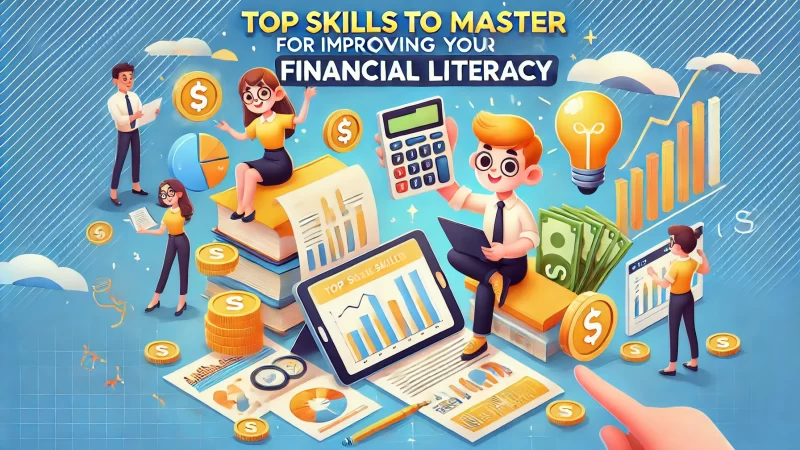
To truly master financial literacy, there are several essential skills you need to develop. Budgeting is perhaps the most foundational skill. Without a clear understanding of how much money is coming in and going out, it’s easy to overspend or get into debt. I always stress the importance of creating and sticking to a realistic budget.
Debt management is another key skill. Many people struggle with balancing debt repayment while saving for the future. I suggest prioritizing high-interest debt first while still contributing to savings, even if only a small amount. Learning how to manage debt responsibly ensures you’re not overwhelmed by payments or interest.
Understanding Budgeting: Creating a Financial Plan That Works
Budgeting is the cornerstone of financial literacy. I advise starting by tracking every dollar you spend for a month to see where your money is going. This gives you a clear picture of your financial habits. Once you know this, you can create a realistic budget that aligns with your income and priorities.
A good budget includes categories for essential expenses, savings, and discretionary spending. I always suggest paying yourself first, meaning that you should contribute to savings before spending on wants. This simple habit ensures you’re consistently building financial security. Budgeting isn’t about restriction; it’s about control.
Budgeting apps can make this process easier. I love using tools like Mint or YNAB (You Need A Budget) to automate expense tracking. These tools allow you to set limits and receive notifications when you’re close to overspending. I believe these resources help people stick to their financial plans more effectively.
One common mistake people make is forgetting to update their budget as their financial situation changes. I recommend reviewing your budget monthly to adjust for unexpected expenses or changes in income. Staying flexible and proactive keeps your financial plan relevant and useful over time.
Finally, successful budgeting requires discipline. I find that setting clear financial goals, like saving for a vacation or paying off a loan, can motivate you to stick to your budget. When you can see the progress toward a goal, it’s easier to resist the temptation to overspend. This builds long-term financial success.
Debt Management: Strategies for Reducing and Eliminating Debt
Effective debt management starts with understanding the type of debt you have. High-interest debt, like credit cards, should be prioritized for repayment. I suggest using methods like the avalanche or snowball approach to tackle this debt. With the avalanche, you pay off the highest-interest debt first, while the snowball focuses on the smallest balances.
Consolidating debt can be a helpful strategy. I advise looking into balance transfer offers or personal loans with lower interest rates. By consolidating, you can reduce the total amount of interest you’ll pay and simplify your payments. This can relieve stress and make debt repayment more manageable.
If you’re struggling with debt, I find that creating a repayment plan is essential. I suggest setting aside a fixed amount each month specifically for debt repayment. Sticking to this plan will gradually reduce your debt without disrupting your other financial goals. Remember, consistency is key in managing debt effectively.
Avoiding new debt is just as important. I always tell people to live within their means and avoid relying on credit for everyday purchases. If you can’t pay off the balance in full each month, reconsider whether the expense is necessary. Limiting credit card use is a simple way to stay out of debt.
Lastly, celebrating small victories is vital in debt management. Every time you pay off a debt, even if it’s small, it brings you one step closer to financial freedom. I recommend rewarding yourself with a non-financial treat, like a day off or a fun activity, to stay motivated. This positive reinforcement helps maintain momentum.
Importance of Saving and Investing for Long-Term Wealth
Saving is essential, but investing is what truly grows your wealth over time. I advise starting with an emergency fund of three to six months of expenses, then focusing on long-term investments. Compound interest works in your favor when you invest consistently, even with small amounts. Over time, your money will grow exponentially.
Retirement accounts like 401(k)s and IRAs offer tax advantages that can accelerate your savings. I suggest contributing to these accounts as early as possible, especially if your employer matches contributions. This is essentially free money that boosts your retirement savings. The earlier you start, the more time your investments have to grow.
Investing in the stock market can feel intimidating, but I find that a diversified portfolio reduces risk. I advise spreading your investments across different asset classes like stocks, bonds, and real estate. This protects your portfolio from market volatility while still allowing for growth. Diversification is key to long-term financial success.
If you’re new to investing, I recommend starting with index funds or ETFs. These funds offer broad exposure to the market at a low cost. They’re a great option for beginners because they require less management and are less risky than picking individual stocks. Over time, they’ve consistently delivered solid returns.
Finally, it’s important to be patient. I often tell people that investing is a marathon, not a sprint. Markets fluctuate, but historically, they’ve always grown over the long term. Staying the course, even during downturns, will yield better results than trying to time the market. Consistency and patience are the cornerstones of successful investing.
How Financial Literacy Reduces Stress and Improves Well-Being
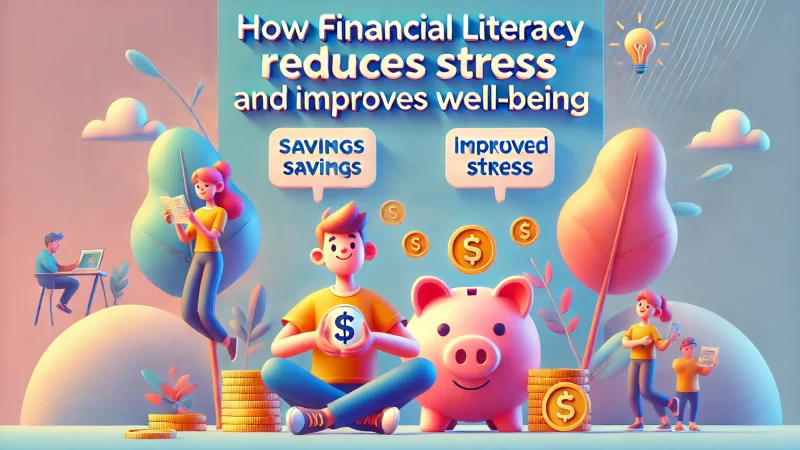
Financial literacy is not just about money—it’s closely tied to mental health and overall well-being. Understanding how to manage finances can reduce anxiety and give you peace of mind. I believe that when you’re in control of your finances, you’re in control of your future. This empowerment can significantly reduce stress levels.
People who are financially literate tend to feel more secure and less worried about unexpected expenses or debt. By making informed financial decisions, you eliminate the uncertainty that often causes stress. I suggest focusing on gaining knowledge and building habits that improve both your financial standing and your mental well-being.
The Link Between Financial Literacy and Mental Health
Financial literacy and mental health are deeply connected. I’ve found that financial stress is one of the leading causes of anxiety and depression. When you’re constantly worried about making ends meet, it takes a toll on your mental health. Learning how to manage money effectively can greatly reduce this burden, leading to a healthier mind.
Managing debt is one area where financial literacy can significantly improve mental health. I suggest developing a clear plan for paying off debt, which reduces the uncertainty and constant worry about bills. Even small progress toward debt reduction can lift a heavy mental burden and improve your outlook on life.
Budgeting plays a key role in this connection. I recommend creating a realistic budget to ensure that your expenses don’t exceed your income. Knowing exactly where your money is going each month helps reduce feelings of chaos. With a solid budget in place, you’ll feel more organized and in control of your financial life.
The impact of savings on mental health cannot be understated. I often encourage people to build an emergency fund as a financial safety net. Having money set aside for unexpected situations, like medical emergencies or job loss, provides immense peace of mind. It reduces the constant worry about “what if” scenarios.
Finally, education in personal finance gives you confidence in managing financial decisions. I know that confidence can directly combat feelings of inadequacy or overwhelm that come from financial stress. As you become more financially literate, your mental resilience grows, leading to a better overall sense of well-being.
Financial Security and Its Positive Impact on Stress Reduction
Financial security is a major factor in reducing stress. I believe that having a solid financial plan creates a sense of security that leads to peace of mind. When you know that you’re prepared for both short-term needs and long-term goals, it’s easier to relax and focus on other areas of life.
A well-established emergency fund plays a crucial role in creating this security. I recommend setting aside enough to cover three to six months of living expenses. This cushion ensures that you can handle unexpected costs without needing to rely on credit cards or loans, which often cause financial stress.
Another element of financial security is having the right insurance coverage. I advise regularly reviewing your health, home, and life insurance policies to ensure they provide adequate protection. The right coverage ensures that, in the event of a crisis, you’re not left with overwhelming out-of-pocket expenses that could derail your finances.
Long-term planning for retirement also reduces financial anxiety. I always suggest contributing consistently to retirement accounts, like a 401(k) or IRA. Knowing that you’re saving for the future alleviates worries about financial instability in later years. This proactive approach helps reduce stress now while preparing for future comfort.
Reducing debt contributes immensely to financial security. I recommend focusing on paying off high-interest debt first to free up more of your income for savings and investments. The less debt you carry, the more control you have over your finances, and the less financial stress you’ll experience.
Smart Money Decisions for a Balanced and Happy Life
Smart money decisions are essential for achieving a balanced and happy life. I find that when you make choices aligned with your financial goals, you create harmony between your finances and overall well-being. One of the smartest decisions is living within your means, which helps you avoid debt and financial strain.
Setting financial priorities is another smart decision. I suggest identifying what matters most to you, whether it’s saving for a house, traveling, or paying off debt. By aligning your spending with your values, you’ll feel more fulfilled and less stressed about money. It’s not about depriving yourself, but about mindful spending.
Regularly reviewing and adjusting your financial plan is also key. Life circumstances change, and your financial strategy should adapt accordingly. I recommend reassessing your budget, investments, and savings goals at least once a year to ensure they still support your current lifestyle and future goals. This keeps your finances flexible and balanced.
Investing in your financial education is one of the best smart money decisions you can make. I’ve seen how understanding personal finance empowers people to make better decisions. The more knowledgeable you are, the more confident and secure you feel. This confidence spills over into other aspects of your life, fostering balance.
Finally, prioritizing long-term financial health over short-term gains leads to a more balanced life. I advise resisting the urge for instant gratification when it comes to spending. Focus instead on making choices that support your future self. This mindset not only secures your financial well-being but also enhances your overall happiness and peace.
Practical Steps to Enhance Your Financial Literacy Today
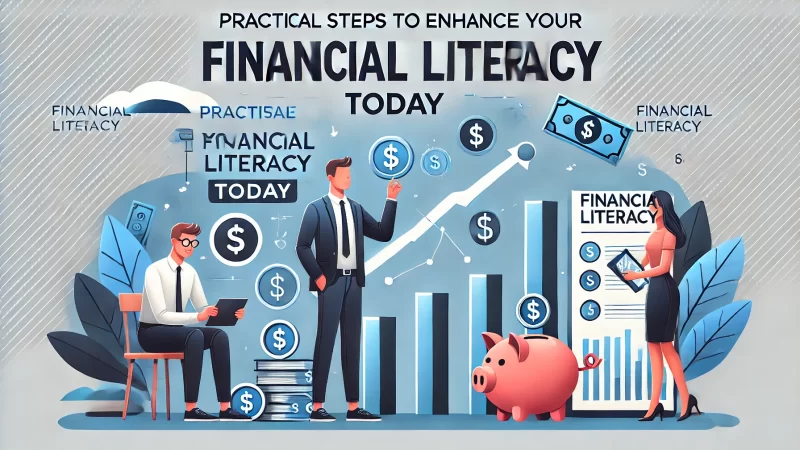
Improving your financial literacy is an ongoing process, but there are easy steps you can take today to start seeing results. I suggest setting aside time to learn about key financial topics such as budgeting, saving, and investing. Committing even 10-15 minutes a day can make a big difference in your overall understanding.
Taking small, actionable steps can lead to massive improvement. Start by reviewing your personal budget and tracking your expenses. I recommend using free or low-cost tools that make managing your finances easier. The more actively you engage with your financial habits, the more confident you’ll become in handling your money.
Free and Paid Resources to Boost Your Financial Knowledge
There are countless resources available for anyone wanting to increase their financial literacy. I always recommend starting with free resources like blogs, podcasts, and YouTube channels. These offer valuable insights into personal finance without costing a penny, and they cover everything from debt reduction to investing.
Online courses are another fantastic way to deepen your understanding. Platforms like Coursera and Udemy offer both free and paid courses on various financial topics. I find these particularly helpful if you want a structured learning experience. You can learn at your own pace and revisit complex topics whenever necessary.
Books are still one of the best resources for building financial knowledge. I’ve read books like Rich Dad Poor Dad and The Total Money Makeover, which offer practical advice on wealth building. I advise incorporating reading into your financial education journey, as books often provide more in-depth insights than short articles.
If you prefer a more personalized approach, I suggest attending financial seminars or workshops. Many of these events are free and offer opportunities to ask experts questions about your unique financial situation. Live events also connect you with a community of people who are equally focused on financial growth.
For those willing to invest a bit, hiring a financial advisor can fast-track your financial literacy. I believe that working with a professional provides tailored advice and strategies for managing your money. This one-on-one support helps you apply financial concepts to your personal goals and challenges.
Online Tools and Apps to Help You Stay Financially Organized
Technology has made staying financially organized easier than ever. I recommend using budgeting apps like Mint and YNAB (You Need A Budget). These apps help you track your spending, set financial goals, and keep your budget on track with minimal effort. They also send helpful reminders to keep you accountable.
If you’re looking to manage investments, apps like Robinhood and Acorns are fantastic tools for beginners. I’ve found that these platforms make investing less intimidating by offering user-friendly interfaces and educational content. They allow you to start investing with small amounts, making it accessible to nearly everyone.
For debt management, I suggest using apps like Debt Payoff Planner or Tally. These apps help you create a structured repayment plan and calculate how long it will take to become debt-free. I’ve noticed that having a clear roadmap makes tackling debt feel more manageable and less overwhelming.
Emergency funds and savings are essential, and apps like Digit and Qapital can help you build these funds without even noticing. I love how these apps round up your spare change and deposit it into a savings account. It’s a painless way to build up your financial cushion over time.
Lastly, for overall financial wellness, I recommend tools like Personal Capital, which track both your spending and your investments. These all-in-one platforms give a clear view of your financial health and allow you to monitor your progress toward long-term goals. Staying organized with these tools makes financial literacy more actionable.
Ways to Incorporate Financial Learning into Your Daily Routine
Incorporating financial learning into your daily routine doesn’t have to be time-consuming. I advise starting your mornings by reading or listening to a quick finance-related article or podcast. This helps you stay updated on current financial trends and gives you bite-sized knowledge you can apply throughout your day.
Use your commute time wisely by listening to personal finance podcasts. I find podcasts like The Dave Ramsey Show or ChooseFI provide valuable tips in a conversational and engaging way. Whether you’re driving or exercising, this can turn unproductive time into an opportunity for financial growth.
Another effective strategy is setting daily or weekly financial goals. I often recommend setting small, achievable targets, like tracking your spending for a day or increasing your savings by a specific amount. Accomplishing these micro-goals boosts your confidence and creates a habit of financial mindfulness.
Reviewing your finances regularly is also essential. I advise taking 5-10 minutes each evening to review your budget, track expenses, or check on your investment performance. This daily check-in reinforces good habits and helps you stay on top of your financial goals without feeling overwhelmed.
Finally, I believe in the power of community learning. Engage in discussions about finance with friends or online groups. I’ve found that sharing experiences and learning from others can provide new insights and keep you motivated. The more you talk about money, the more natural financial literacy becomes in your daily life.
Why Financial Literacy Matters at Every Stage of Life
Financial literacy is not just for one stage of life—it’s a lifelong skill that impacts your financial security and well-being. I believe that whether you’re just starting out, raising a family, or preparing for retirement, knowing how to manage your money will improve your quality of life significantly.
The earlier you start learning about personal finance, the better off you’ll be. I advise young people to build strong financial habits early on. However, it’s never too late to enhance your financial literacy. Even in later stages of life, sharpening your financial skills can help you make informed decisions and secure your future.
How Financial Literacy Affects Young Adults and College Students
For young adults and college students, financial literacy lays the foundation for future success. I suggest learning about budgeting and managing student loans as soon as possible. These are critical skills that will help you avoid falling into debt early in life. I’ve seen how financial missteps at this stage can lead to years of struggle.
Building credit responsibly is another key concept. I always recommend getting a credit card but only using it for small, manageable purchases. Paying off the balance each month builds a strong credit score, which will be crucial for securing loans, renting apartments, and even job opportunities in the future.
Saving early—even if it’s a small amount—can have a massive impact down the road. I advise starting a savings account or, if possible, contributing to a retirement plan like a Roth IRA. Compound interest is your best friend, and the earlier you start, the more time your money has to grow.
Young adults should also begin learning about investing. I find that starting with index funds or robo-advisors is a great way to dip your toes into the world of investing without needing expert-level knowledge. Even a modest investment can grow over time, helping you build wealth for the future.
Lastly, I suggest learning about financial independence and how to live below your means. Avoiding lifestyle inflation—where you spend more as you earn more—is key to achieving financial security. Keeping expenses low while your income grows creates a gap that you can use to save and invest, setting you up for long-term success.
The Importance of Financial Knowledge for Middle-Aged Adults
For middle-aged adults, financial literacy becomes crucial in planning for the future and managing current responsibilities. This is a time when people may be balancing homeownership, raising children, and planning for retirement. I believe that strong financial knowledge at this stage is critical to securing your family’s financial future.
One of the key areas to focus on is retirement planning. I recommend maximizing contributions to retirement accounts, such as 401(k)s or IRAs. At this stage, you may be in your peak earning years, and contributing as much as possible will help secure a comfortable retirement. Time is still on your side, but it’s essential to act now.
Another priority is managing debt, especially if you have a mortgage or are still paying off loans. I suggest developing a clear strategy for debt reduction so you can enter retirement debt-free. Paying down high-interest debt should be a priority, as this frees up more of your income for savings and investments.
For those with children, saving for their education becomes an important consideration. I always advise exploring options like 529 plans or other college savings accounts. These tax-advantaged accounts help reduce the financial burden of education costs, ensuring your children start their adult lives without excessive debt.
Finally, I recommend keeping an eye on estate planning. As your financial assets grow, it’s important to have a plan in place for passing those assets on. Creating a will, assigning beneficiaries, and considering life insurance are all essential steps for protecting your family’s financial future.
Preparing for Retirement Through Strong Financial Literacy
Retirement is one of the biggest financial goals people plan for, and it requires a deep understanding of personal finance. I believe that financial literacy is the cornerstone of a successful retirement plan. By understanding investments, taxes, and withdrawal strategies, you can ensure a steady income throughout your retirement years.
I advise starting by determining how much money you will need to live comfortably in retirement. This depends on your lifestyle, healthcare needs, and any debts you may still have. Once you have a target number, I suggest working backward to determine how much you need to save and invest each year to meet that goal.
Diversifying your retirement income streams is another important aspect of financial literacy. I always recommend having multiple sources of income, such as Social Security, pensions, and investment accounts. This ensures that you’re not solely reliant on one source and can better weather market fluctuations or unexpected expenses.
Knowing when and how to withdraw from retirement accounts is also crucial. I find that many people are unsure of the tax implications of withdrawing from 401(k)s or IRAs. I advise learning the rules for these accounts and working with a financial advisor to create a withdrawal strategy that minimizes taxes and maximizes your income.
Finally, I suggest staying financially engaged even in retirement. Many retirees make the mistake of thinking they can stop paying attention to their finances once they’ve stopped working. However, maintaining a basic level of financial literacy ensures you’re able to adapt to changes in the economy or your personal situation.
Common Mistakes to Avoid on Your Financial Literacy Journey
When improving financial literacy, even small missteps can lead to significant consequences. I believe that understanding these common mistakes can save you from unnecessary stress and setbacks. With the right guidance, you can avoid these traps and confidently manage your finances as you work toward your long-term goals.
Lack of knowledge in areas such as budgeting, credit, and investing often causes people to struggle with their finances. I suggest paying attention to these specific areas so you can make informed decisions. A clear understanding of these fundamentals can make a noticeable difference in achieving financial success.
Overlooking the Importance of a Budget
Budgeting is the foundation of financial literacy, yet many people fail to see its importance. I often hear that budgeting feels restrictive, but I argue that it’s quite the opposite. A well-crafted budget gives you freedom, allowing you to control where your money goes and ensuring you can meet your financial goals.
I suggest starting with a simple budget that tracks your income and expenses. The more you familiarize yourself with your spending patterns, the easier it will be to adjust your finances. Tracking your money doesn’t mean sacrificing enjoyment—it helps you prioritize what truly matters.
Without a budget, overspending becomes all too easy. I recommend setting monthly limits for discretionary spending categories like dining out and entertainment. Doing so prevents those categories from eating into your savings and other essential expenses. Remember, financial discipline now can lead to greater freedom later.
Many people also forget to factor savings into their budget. I suggest treating your savings like any other bill. Automate it, if possible, to ensure you’re consistently contributing to an emergency fund or long-term savings goals. Saving as part of your budget helps create financial security, reducing anxiety about unexpected expenses.
Lastly, I encourage regular reviews of your budget. Circumstances change—whether it’s a raise, new expenses, or debt repayment. Adjusting your budget accordingly keeps it relevant, ensuring that it continues to serve your needs and helps you achieve your financial goals.
Misunderstanding Debt and Credit Usage
Debt can be overwhelming if not managed correctly. I know that many people misunderstand how credit works, leading them into a cycle of high-interest debt. The key is understanding the difference between good debt, like a mortgage, and bad debt, like credit cards, and managing both responsibly.
I always recommend paying off high-interest debt first. Interest compounds quickly, making it hard to get ahead if you’re only making minimum payments. By focusing on high-interest debt, you’ll reduce the total amount you owe over time. This is one of the most important steps toward financial freedom.
Keeping credit utilization low is another essential tip. I suggest using no more than 30% of your available credit limit at any given time. A high utilization rate can hurt your credit score, making it harder to secure loans or favorable interest rates. Lower usage shows lenders that you’re responsible with credit.
Late payments can severely impact your financial health. I encourage setting up automatic payments or reminders to avoid missing due dates. Late fees and penalties quickly add up, and missing a payment can harm your credit score for years. Staying on top of payments builds trust with lenders and improves your financial standing.
Lastly, I advise against closing old credit accounts, as long as they’re not costing you money. Keeping older accounts open contributes to a longer credit history, which can positively affect your credit score. Credit history shows lenders your experience with managing credit over time, which plays a big role in determining your creditworthiness.
Avoiding Investment Due to Lack of Knowledge
Many people shy away from investing because they feel they don’t know enough. I understand this fear, but I believe that avoiding investment entirely can be a costly mistake. Learning the basics of investing is simpler than most people realize and is crucial for long-term financial growth.
I often recommend starting with index funds or exchange-traded funds (ETFs). These options offer a low-cost, low-risk way to enter the world of investing. You don’t need to pick individual stocks or time the market—index funds track broader markets, providing consistent growth over time without much active management.
A common misconception is that investing requires a lot of money. I find that this keeps many from starting early. The truth is, you can begin with small amounts through apps like Acorns or Robinhood. These platforms allow you to invest as little as a few dollars, making the process more accessible to everyone.
Diversification is a critical investment strategy. I suggest spreading your investments across different asset classes like stocks, bonds, and real estate. This reduces risk because if one market dips, the others might remain stable or even grow. Diversification provides a balanced approach to building wealth.
Lastly, I recommend staying informed about your investments. While long-term investments don’t require daily monitoring, reviewing your portfolio periodically ensures you stay on track with your goals. The more knowledgeable you become about the markets and your options, the more confident you’ll feel about investing.
How Financial Literacy Improves Decision-Making and Goal Setting
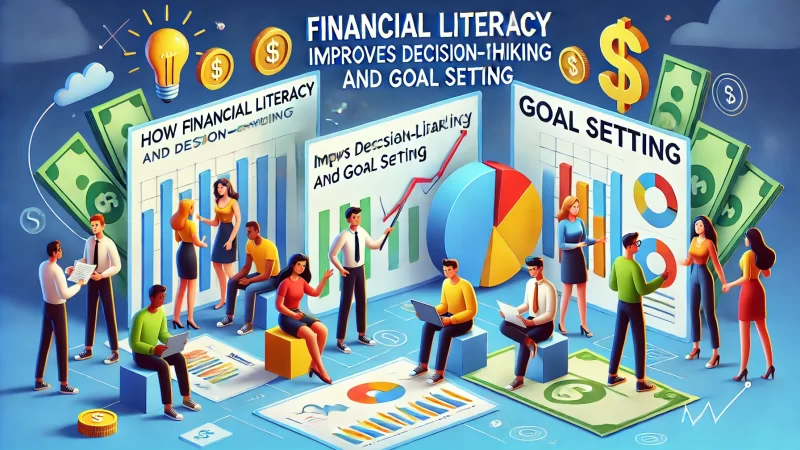
Financial literacy doesn’t just help you manage money—it enhances decision-making and sets you on a clear path toward your goals. I believe that with a solid understanding of personal finance, you can make informed decisions that align with both your current needs and long-term aspirations.
Knowing how to manage your finances allows you to confidently set and achieve meaningful financial goals. Whether it’s paying off debt, saving for a home, or building a retirement fund, financial literacy gives you the tools to make these dreams a reality. The better you understand your finances, the more achievable your goals become.
Aligning Financial Knowledge with Personal and Career Goals
Aligning your financial literacy with your personal and career goals is essential for long-term success. I recommend reviewing your current financial situation and identifying areas that support your ambitions. Whether it’s pursuing higher education or starting a business, understanding how your money works makes these goals attainable.
I’ve learned that having clear financial goals brings clarity to your decision-making process. For instance, if you aim to advance your career, you might decide to invest in professional development. Understanding how much this investment will cost—and how you’ll fund it—helps you plan ahead and make smart financial moves.
Balancing personal goals, like buying a home or traveling, with career-related goals is also important. I suggest setting financial boundaries for each area, so you don’t sacrifice one goal for another. Financial literacy gives you the knowledge to manage multiple priorities without feeling overwhelmed or uncertain.
One of the biggest benefits of financial literacy is confidence in negotiation. I advise using your knowledge to negotiate higher salaries, better job offers, or beneficial contracts. Knowing your worth, along with your financial goals, gives you leverage in career negotiations, ensuring your personal and professional goals align.
Lastly, I emphasize that aligning financial knowledge with your goals ensures long-term financial independence. The more you know about managing money, the better equipped you are to make decisions that contribute to your independence and security. Financial literacy leads to better outcomes in every aspect of your life.
How to Set SMART Financial Goals with Confidence
Setting SMART (Specific, Measurable, Achievable, Relevant, Time-bound) goals is essential for financial success. I suggest starting with one specific goal, such as paying off credit card debt. Breaking it down into measurable steps, like making extra payments each month, ensures steady progress without feeling overwhelmed.
I’ve noticed that achievable goals are motivating. For example, instead of aiming to save $10,000 in a year, you might focus on saving $200 each month. This feels more realistic and manageable. Achieving smaller milestones builds confidence and encourages you to keep working toward larger financial objectives.
Relevant goals are also important for staying focused. I recommend setting financial goals that are directly tied to your personal priorities. If homeownership is a goal, your savings plan should prioritize a down payment. Keeping your financial goals relevant to your life ensures that they remain motivating and worthwhile.
Time-bound goals help keep you accountable. I always suggest giving yourself clear deadlines, like paying off debt in two years or saving $5,000 by the end of the year. This sense of urgency keeps you on track and encourages consistent effort. Time limits create a sense of purpose and help you measure your success.
Finally, I believe that regularly reviewing your goals ensures they stay aligned with your evolving financial situation. Life changes, and so do priorities. I recommend reassessing your goals periodically to ensure they still make sense for your current circumstances and future aspirations.
Financial Literacy as a Tool for Achieving Financial Independence
Financial literacy is the key to achieving true financial independence. I believe that understanding how to manage money empowers you to live life on your own terms. With the right financial knowledge, you can break free from debt, build wealth, and achieve independence, regardless of your starting point.
One of the first steps is creating multiple streams of income. I always suggest investing in assets that generate passive income, such as stocks or rental properties. This ensures you’re not solely dependent on a paycheck and can continue building wealth even while you sleep. Financial literacy helps you identify these opportunities.
Building an emergency fund is crucial for financial independence. I recommend saving at least three to six months of living expenses. This fund protects you from unexpected financial shocks, such as job loss or medical bills, allowing you to remain financially secure without relying on debt.
Investing is another powerful tool. I find that long-term investments in diversified portfolios give you the financial cushion to live independently. The earlier you start investing, the more time your money has to grow. Financial literacy helps you understand the risks and rewards associated with different types of investments.
Debt freedom is a cornerstone of financial independence. I advise prioritizing debt repayment, especially high-interest debts like credit cards. Being debt-free means you can use your money to invest, save, and pursue personal goals rather than making payments to creditors. This is a critical step in achieving lasting independence.
Lastly, financial literacy enables you to plan for the future. I suggest learning about retirement accounts, tax strategies, and estate planning. Having a clear plan in place ensures that your wealth will continue to grow and provide for your needs, giving you the freedom to live comfortably and securely well into the future.
The Role of Technology in Advancing Financial Literacy
Technology has transformed the way we approach financial literacy, making it more accessible and engaging. I’ve noticed that with a wide array of tools available, anyone can easily learn the essentials of managing money. From apps to online courses, technology simplifies complex financial concepts, making them digestible for users at every level.
I believe that harnessing these digital innovations can significantly accelerate your financial education. Whether you’re tracking your budget or learning how to invest, technology provides the convenience and flexibility to learn on your own terms. Let’s explore how various digital platforms are helping people improve their financial literacy in practical ways.
Apps and Digital Resources to Expand Financial Understanding
Apps have revolutionized personal finance, giving people the tools to understand and manage their money right from their phones. I recommend apps like Mint or YNAB (You Need A Budget) to track your expenses and create a financial plan. These platforms offer real-time updates and reports, helping you stay on top of your finances with minimal effort.
Investing apps like Robinhood or Acorns are excellent for those just starting to invest. I find these apps user-friendly, with educational resources built into the platform. Whether you’re investing spare change or learning about stocks, these apps make the process approachable for everyone, regardless of experience level.
For debt management, I suggest looking into apps like Tally or Debt Payoff Planner. These resources help you strategize repayments, focusing on high-interest debt first. I’ve seen how this structure not only reduces debt faster but also eases the psychological burden of debt. It’s a step-by-step guide toward financial freedom.
I also recommend exploring educational platforms like Coursera or Udemy, which offer structured courses on personal finance and investing. I love how these platforms allow you to learn at your own pace, providing both free and paid options. Courses range from beginner to expert levels, covering a wide range of financial topics.
Finally, using digital banking tools from services like PayPal or Revolut can improve your financial habits. I believe these platforms are invaluable for understanding international transactions, managing multiple currencies, and budgeting your spending. By utilizing these resources, you can master global financial literacy effortlessly.
How Social Media Can Be a Powerful Financial Learning Tool
Social media is often overlooked as a financial literacy resource, but I’ve found it to be a goldmine of practical knowledge. Platforms like YouTube, Instagram, and TikTok host countless experts who share financial tips and advice. Following financial influencers can help you stay updated on trends and learn simple strategies to improve your money management.
YouTube offers in-depth tutorials and explanations on complex financial topics. I suggest subscribing to channels like The Financial Diet or Graham Stephan, which provide engaging and easy-to-understand content. Watching these videos can help clarify topics such as investing, budgeting, and financial planning.
Instagram is another platform where you can find bite-sized financial advice. I enjoy following accounts like Her First $100K or The Budgetnista, which break down personal finance tips in a way that feels accessible. These accounts often share daily financial challenges, tips for saving, and motivation to help you stay on track with your goals.
TikTok’s financial community, known as “FinTok,” is growing rapidly. I’ve seen how short, engaging videos can spark curiosity and provide quick tips that anyone can apply to their finances. The platform offers everything from saving hacks to investing advice, making financial literacy fun and approachable for younger audiences.
Social media also fosters community learning. I encourage joining Facebook groups or Reddit forums focused on personal finance. These spaces allow you to ask questions, share experiences, and gain insights from people at different stages of their financial journeys. It’s an interactive way to expand your knowledge and get support.
Emerging Trends in Financial Technology and Literacy Education
The rise of financial technology (FinTech) is reshaping how people learn about and manage their finances. I’ve noticed how AI-powered platforms are now offering personalized financial advice, automating investments, and optimizing savings strategies. These advancements are democratizing financial literacy, making it accessible to more people than ever before.
One trend I find exciting is robo-advisors, which automate investment strategies based on your financial goals. Platforms like Betterment and Wealthfront use algorithms to help you invest efficiently without requiring deep knowledge of the stock market. I believe these tools are perfect for those looking to grow wealth passively over time.
Cryptocurrency and blockchain technology are also rapidly influencing financial literacy. I recommend learning the basics of crypto, even if you don’t plan to invest. As digital currencies become more mainstream, understanding how they work will be crucial for staying financially literate in a fast-evolving market.
Artificial intelligence is making waves in personalized financial planning. Apps like Cleo or Digit use AI to analyze your spending habits, offer tailored advice, and help you automate savings. I think this trend is powerful because it removes the guesswork from financial planning, helping you make smarter decisions without overwhelming you with data.
Finally, the integration of financial education into gaming is becoming more common. Apps like Fortune City or Financial Football are using gamification to teach money management in a fun, engaging way. I love how these tools make financial literacy less intimidating, especially for younger generations who may prefer interactive learning experiences.
Frequently Asked Questions (FAQ)
What is financial literacy, and why is it important?
Financial literacy is the knowledge and skills needed to make informed financial decisions. It helps you manage money, reduce debt, save, invest, and plan for the future. Being financially literate empowers you to achieve financial independence and avoid common money-related pitfalls.
How can I improve my financial literacy?
Start by educating yourself through books, online courses, and financial blogs. I suggest using budgeting apps to track spending, exploring investing tools like Acorns or Robinhood, and following financial experts on social media for tips. Consistent learning and practice are key.
What are the key components of financial literacy?
The main components of financial literacy include budgeting, saving, debt management, and investing. Understanding credit scores, tax planning, and retirement savings are also crucial. I recommend mastering these areas to build a strong financial foundation and make informed money decisions.
How does financial literacy reduce stress?
Financial literacy reduces stress by helping you take control of your finances. When you understand how to manage your money, you’re less likely to fall into debt or face financial uncertainty. With solid financial knowledge, you can create a budget, save for emergencies, and invest for future goals, leading to peace of mind.
Why should I start learning about financial literacy now?
The earlier you start, the more time you have to apply sound financial principles to your life. Whether you’re just beginning your career or nearing retirement, improving financial literacy helps you make smarter decisions, avoid debt, grow your savings, and achieve financial freedom.
How can financial literacy help me achieve long-term goals?
By understanding key financial concepts, you’ll be able to set realistic goals, such as buying a home or saving for retirement. I recommend using financial literacy to create actionable plans for reaching these milestones, whether through investing, saving, or debt management strategies.


